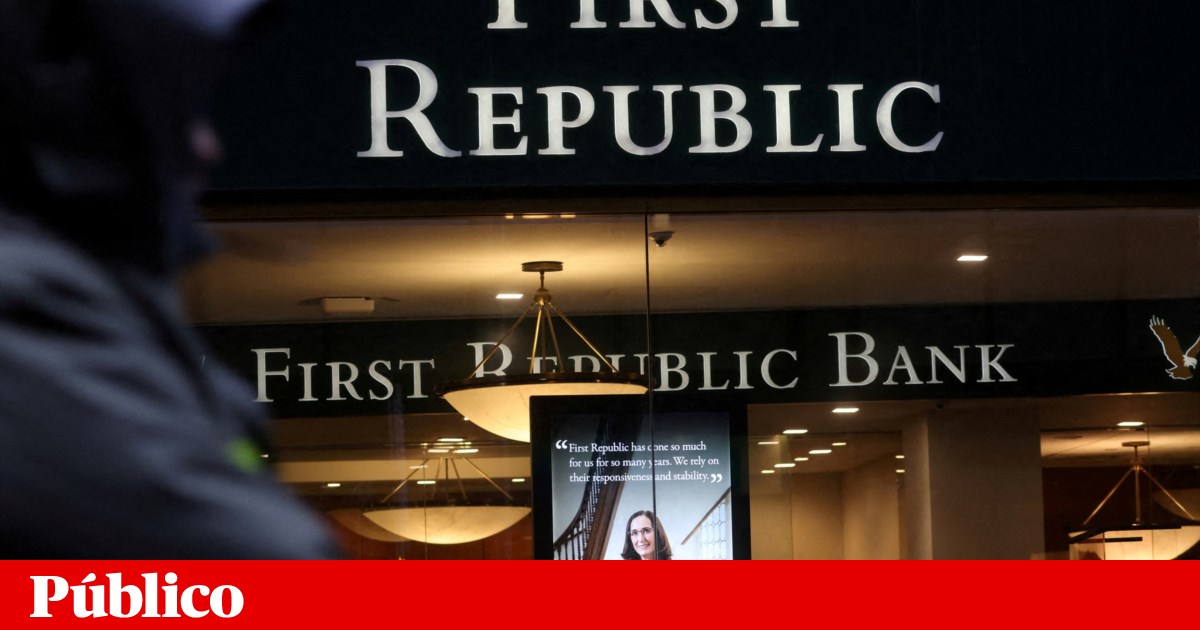On Thursday, a group of 11 banks deposited 30 billion dollars (28.2 billion euros) in the First Republic, in order to provide financial support and show confidence in the institution, which is threatened in the current context of instability, after the collapse of the Silicon Valley bank. (SVB) and Signature Bank, causing the effects of infection.
However, support from institutions such as JP Morgan Chase wasn’t enough to stop the stock’s slide. On March 8th, First Republic stock was valued at $115 a share, and has since suffered a sharp drop that yesterday hit 70%, at around $30. This Friday, at 6:20 pm in Portugal, the value was $26.24, with a daily drop of 26.35%.
Financial Times (foot) He noted that First Republic shares, after their recovery, were suffering from A’s impact negative after announcing its intention to suspend dividend payments “during this period of uncertainty”. The financial institution also said it would reduce its loans and the size of its operations. The San Francisco bank is not alone in this downward trend, which is rippling through institutions large and small, albeit in different ways. Also by 6:20 pm, JP Morgan had lost 3.88%, while smaller institutions, such as PacWest and Western Alliance, were down 14.59 and 13.48%, respectively.
The group that owns SVB, which has already stepped in, asked this Friday for its support for a Chapter 11 restructuring in New York, in order to protect its two other business units related to brokerage and investments in technology.
In Europe, the Stoxx Europe 600 Banks Index fell 2.25%, and Credit Suisse fell 9.23%, even after support from the Swiss Central Bank. On Friday, as Lusa reported, the European Central Bank (ECB) held an extraordinary supervisory meeting to discuss the disruptions taking place in the financial sector in North America.
Support 11 for the first republic
according to The New York TimesAgreement to support The first republic It took just 48 hours for the 11 institutions involved to be contacted, following a phone call between Treasury Secretary Janet Yellen and JP Morgan Chase CEO Jamie Dimon. Four banks (JPMorgan Chase, Bank of America, Wells Fargo, and Citigroup) deposited $5 billion each, thus injecting liquidity into the institution, followed by Goldman Sachs and Morgan Stanley, with $2.5 billion, and PNC Financial, Truist, BNY Mellon. And State Street and the US Bank in billions.
In a joint statement, issued by the four banks that deposited the most funds, the institutions said their work “reflects confidence in the financial system” and “helps ensure First Republic has the liquidity needed to continue serving its clients.” The statement adds that the thirty billion deposited by major banks shows their confidence “in banks of all sizes.” “Regional, medium and small banks are critical to the health and functioning of our financial system,” the institutions say.
After noting that funds were withdrawn from unprotected deposits (protection increased to $250,000), the four institutions assert that “the financial system has strong credit, high liquidity, strong capital and earnings” and that recent events “have not changed this scenario at all.”
high pressure
according to FTFund manager Bill Ackman said on Twitter that the support measures by the 11 banks were a “mock vote of confidence” and that the risk of failure of the First Republic had now extended to these larger institutions.
Altogether, according to FTNorth American banks have already requested $171.9 billion in support from the Federal Reserve in the process, in addition to the $142.8 billion available to guarantee all deposits at SVB and Signature Bank.
Next week, the Fed holds a new meeting at which it will decide on the evolution of interest rates, linked to the problem of potential losses with investments in bonds that put pressure on banks such as SVB.

“Wannabe internet buff. Future teen idol. Hardcore zombie guru. Gamer. Avid creator. Entrepreneur. Bacon ninja.”

